July 31, 2004
DaimlerChrysler's Youth Brand: Competing with Toyota's Scion Growth Strategy

The line would be a spin-off of either Chrysler's Dodge or Jeep brands tailored for Generation Y consumers - the 65 million Americans born between 1977 and 1994, Chrysler Group chief executive Dieter Zetsche told the Detroit News Monday.
The automaker has been considering the idea for a year and has developed three concept vehicles for the marque, according to a company source who said Chrysler expects to make a decision by the end of the year.
-
Gen Y consumers are expected to purchase 1 in 5 vehicles in the United States by 2010, according to J.D. Power and Associates.
Marketing experts say the impact of Generation Y could rival or even exceed that of baby boomers. “This is a trend Chrysler cannot ignore,” said Michael Robinet, an automotive analyst with CSM Worldwide in Farmington Hills.
A youth-oriented brand could introduce Chrysler to buyers who might otherwise ignore the smallest of Detroit’s automakers. The average Dodge customer is 44 years old, while Jeep buyers average 43 and Chrysler brand buyers average 50, according to J.D. Power and Associates’ Power Information Network, which studies dealer sales data. The average age of buyers of all vehicle brands is 46.
“Some people feel you need to have a $12,000 car, either built domestically or imported from somewhere else,” said George Murphy, Chrysler’s senior vice president for global brand marketing. “Some people believe you’re basically served with used cars, which is 75 percent of what people under 25 buy.
“I haven’t seen much to tell me that our current brands can’t reach younger target audiences with the right products.”
Any new brand will not be affiliated with the Chrysler brand, which Chrysler is trying to move upscale with premium vehicles such as the new 300 sedan. It would be more likely a spinoff of Jeep or Dodge, which have younger average buyers.
Chrysler is likely to seek out a joint venture partner, perhaps in a low-cost country such as China or South Korea, to share engineering and parts for the new brand. Because of high labor costs, it’s often impossible to make a profit on small, low-price vehicles produced in the United States.
“You should look for some cooperation for execution of this idea,” Zetsche said, but that does not necessarily mean Japan’s Mitsubishi Motors Corp. and Hyundai Motor Co. in South Korea. Both companies are partially owned by DaimlerChrysler and linked with the automaker on several existing vehicle projects.
Toyota rolled out its youth-oriented Scion brand last year. The compact and uniquely-designed cars start at around $16,000 and are meant to be a test case for Toyota as it tries to discern the preferences of up-and-coming buyers. Toyota hopes to sell 100,000 Scion vehicles in the United States in 2005 after a staggered roll out this year.
“Toyota is breaking new ground that is likely causing most other mainstream manufacturers to take a look at their youth strategies,” Robinet said.
While Ford Motor Co. has won over young buyers with its Focus sedans and hatchbacks and General Motors Corp. has reached Gen X and Y customers with its Saturn brand, neither has launched a nameplate aimed squarely at those groups. Honda has also found room for the youth-targeted Element SUV within its lineup without creating a whole new brand.
But there are no guarantees that youth-driven brands or designs will ultimately attract youthful drivers. Scion draws more Gen Y buyers than any other marque — 19.1 percent of sales are to consumers 25 and under — but the average age of Scion buyers is still 40, according to J.D. Power and Associates. And Honda’s Element has an average buyer age of 43.
In the end, Chrysler may decide that adding another brand is too costly and too risky, given the already crowded landscape of vehicle nameplates in the United States.
But if Chrysler rolls out new, low-cost cars, Dan Frost believes he can sell them. “We don’t offer (young buyers) a car at all,” said Frost, president of Southfield Chrysler Jeep. “The closest we come is a Dodge Neon.”
- Arik
July 30, 2004
Reality TV vs. Democracy: DNC Media Coverage
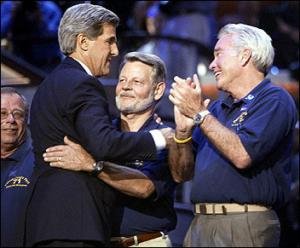
LA Times media columnist Tim Rutten suggested that prime time TV networks should cover the Democratic National Convention a bit more than they're doing, and do a little less reality TV:
-
The most serious problem confronting the American news media today is neither creeping political bias nor the tensions between new and old technologies. Those topics may obsess media critics, but their significance pales alongside the greater issue, which is corporate managers' growing inability to distinguish between the public's interest — fascination with entertainment and celebrity - and the public interest - a deference to the common good.
The situation with this week's Democratic National Convention in Boston is a window on what this failure of discernment may imply for the future of the mainstream press. It is difficult, of course, to argue that any event attended by 15,000 journalists is in any sense under-covered. But an ever-growing number of those journalists are employed by newspapers, magazines, and radio and television stations whose ever-smaller number of corporate owners expect them to function first and foremost as "business units."
This process of acculturation is most advanced among the three broadcast networks — ABC, a Disney property; CBS, which belongs to Viacom; and NBC, a division of General Electric. Their combined audience of almost 30 million is vastly larger than that of any other broadcast outlet, and, unlike cable subscribers, they receive their broadcasts free.
How much convention coverage are they providing?
An hour a night - over three of four nights.
Jim Lehrer, the public television anchor, put the situation precisely at a preconvention panel at Harvard on Sunday. "We're about to elect a president of the United States at a time when we have young people dying in our name overseas," he said. "We just had a report from the 9/11 commission which says we are not safe as a nation, and one of these two groups of people [Democrats or Republicans] is going to run our country. The fact that you three networks decided it was not important enough to run in prime time, the message that gives the American people is huge."
So too were the sentiments conveyed by the three network anchors in an extraordinary series of interviews with the New York Times.
ABC's Peter Jennings spoke of his frustration with his network's truncated broadcasts. "This is clear to my bosses, it's clear to my colleagues; I think you'll find the same thing in every [network] newsroom. Could we, should we be doing more than one hour a night in prime time? The answer is yes."
Dan Rather of CBS wearily recalled how his opposition to network cutbacks began a decade ago, when management began scaling back the coverage. "I argued the conventions were part of the dance of democracy and that rituals are important and that they remained an important ritual," he told the Times. "I found myself increasingly like the Mohicans, forced farther and farther back into the wilderness and eventually eliminated."
NBC's Tom Brokaw requested more time from his overseers and was turned down. "This is why God invented cable," he said. "People who want to watch long-form convention coverage have got a place to do it."
So, if you were one of the millions of viewers this week treated to worm munching (NBC's Fear Factor), vomiting (CBS's Big Brother 5) and liposuction (ABC's Extreme Makeover) instead of primetime convention coverage from Boston's Fleet Center, I don't know that you can blame TV if you don't get out and vote.
- Arik
July 29, 2004
Apple vs. RealNetworks as iPod Wars Begin
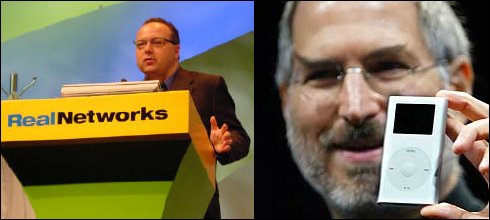
Apple went after RealNetworks new Harmony software as the company reverse-engineered a solution to allow its songs to play on the iPod, rather than forcing iPod users to also buy from Apple's proprietary iTunes music downloading service:
-
Apple Computer on Thursday issued a statement attacking RealNetworks Inc., a provider of digital-media services, for offering software lets online music buyers at Real's music store play their songs on Apple's iPod music players.
Many music-playing devices include proprietary copy-protection schemes that limit what music can be played on them, depending on what service that music was purchased from. Real said its software would allow songs downloaded from its music store to be played on Apple's iPods.
Apple said it's "stunned that RealNetworks has adopted the tactics and ethics of a hacker to break into the iPod."
RealNetworks' software, called Harmony, was introduced earlier this week. Real describes it as the world's first digital-rights-management translation system that music buyers can use to transfer music from one secure music device to another. Among the devices supported by Harmony are those made by Creative, iRiver, palmOne, RCA, Rio, and Samsung.
Apple said it's investigating "the implications of their actions under the [Digital Millennium Copyright Act] and other laws. We strongly caution Real and their customers that when we update our iPod software from time to time it is highly likely that Real's Harmony technology will cease to work with current and future iPods."
The Digital Millennium Copyright Act was passed into law in 1998 and makes it illegal to circumvent encryption and copy-protection technology to access copyright-protected property.
Legal experts say that unless Apple can show that RealNetworks reverse engineered Apple's iPod software, it could be very difficult to make a case under the DMCA.
"First question is, to develop Harmony, did RealNetworks have to break copy protection used by iTunes?" says Mark Rasch, former head of the U.S. Department of Justice's computer crimes unit and now senior VP of security services firm Solutionary Inc. "But even then there are exceptions under the DMCA for interoperability."
Another question would be whether or not RealNetworks reverse engineered iTunes software to create Harmony. ITunes is the name of Apple's online music store. "We really need to know more about how Harmony was developed and how it works to understand the potential legal implications," Rasch says.
In a statement E-mailed to InformationWeek, RealNetworks contends that Harmony follows "a well-established tradition of fully legal, independently developed paths to achieve compatibility. There is ample and clear precedent for this activity, for instance the first IBM-compatible PCs from Compaq.
"Harmony technology does not remove or disable any digital-rights-management system. Apple has suggested that new laws such as the DMCA are relevant to this dispute. In fact, the DMCA is not designed to prevent the creation of new methods of locking content and explicitly allows the creation of interoperable software," the statement reads.
RealNetworks says it's "fully committed" to its Harmony technology.
"The problem with the DMCA is that it gives more protection than copyright law and it allows companies to skew the market with a form of protectionism," Rasch says. "It allows technological protectionism to be legally adopted, and it works to prevent people from coming to market with cheaper compatible products."
So, can Real break the Apple monopoly or can Apple successfully defend against Real's attempt to stay relevant?
- Arik
UPDATE: Tuesday 17 August 2004 - RealNetworks slashes prices on MP3s to 49 cents and $4.99 an album in money-losing bid to draw attention away from iTunes.
July 28, 2004
Interbrand’s "Best Global Brands 2004"
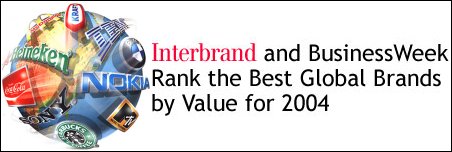
-
Based on its high brand loyalty and strong sales of the iPod, Apple (No. 43) is the biggest mover with a 24% gain in brand value. Other big gainers include Yahoo!, No. 61 (up 17%); Amazon, No. 66 (up 22%); Samsung, No. 21 (up 16%); and HSBC, No. 33 (up 15%). Online auctioneer eBay debuts on the list this year at No. 60. As BusinessWeek notes, even established brands such as Coca Cola (No. 1) and Microsoft (No. 2) “have started to recognize the need to nurture stronger ties with consumers.” Microsoft has started mini-trade shows in airport lounges and Coca Cola has opened hip "Coke Red Lounges" for teenagers in suburban malls.
Meanwhile, BusinessWeek tried to crack the code on "cult brands" such as Apple and Starbucks and why the online world and mass customization have empowered consumer choice more than ever before:
-
A customer spurned, the logic goes, is a customer lost. But these days the relationship between brands and their customers has become much more complex. For one thing, consumers simply know more than they used to. The Internet opens up a wealth of information, allowing for instant price and quality comparisons. But consumers demand more from the brands they love than simple reliability; passionate consumers want their brands to become a form of self-expression. Increasingly, consumers are customizing products and services to achieve that -- whether it's tailoring colors on a pair of sneakers from Nike Inc. or adding items to their personal to-watch list on eBay. Instead of arms-length customers, they're beginning to act like and feel like owners or members of a community. They no longer passively consume. Through the Internet, they can talk back and talk to one another. They can ignite a groundswell of positive buzz or spawn a revolt. As Peter Weedfald, senior vice-president for strategic marketing and new media at Samsung Electronics North America, puts it: "Consumers are empowered in a way that's almost frightening."
This seismic shift in clout from companies to their customers is creating opportunities, especially for younger brands that grew up with the Internet and have become adept at building user communities. Meanwhile, some traditional brands, such as Coca-Cola and Microsoft, are struggling to retain their mammoth leads in a market where consumers increasingly resist what they see as bland ubiquity and a surfeit of power.
Looks like even the biggest of companies, no matter how strong their relative global power of brand, need to keep working to stay on top. I did find it interesting that, of the top 10, eight were U.S. companies, and overall, of the top 100, 58 were U.S. firms.
- Arik
July 27, 2004
Democrats Hit Boston, Republican Intel Ops Up the Street, Kerry Weaker in Polls
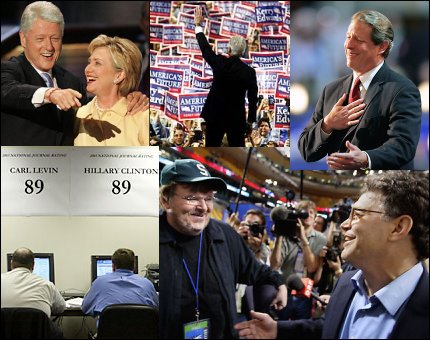
-
I thought Gore's speech was terrific and well-received. But his reception was nothing like Hillary's. Even before she walks onstage, the mere mention of her name by convention emcee Bill Richardson brings the house down. For the first time all night, the roar becomes so loud I have to press my fingers against my ears.
Her speech is soporific, a collage of the usual expensive promises: health insurance for all, more funding for first responders, more benefits for veterans, and, of course, more money for New York City. "I know a thing or two about health care," she adds, and everyone laughs. But this crowd, including Hillary, thinks the joke is just about bad politics. They don't understand that it was bad policymaking, too.
No matter. Hillary knows she'll end with the night's surest applause line, introducing her husband. The place goes nuts as Bill strides forward. You have to see him standing where lesser mortals have stood—in this case at the podium 100 feet from me—to appreciate what an imposing figure he cuts. The frost that has covered his hair since he left office accentuates the effect. In the arena, far more so than on the TV screen, he looks so majestic you almost can't believe the trashy, pointless, inconsequential way in which he disgraced his office.
If you don't like what the Republicans are doing—taking cops off the street, putting tax cuts for the rich before homeland security—"take a look at John Kerry, John Edwards, and the Democrats," Clinton concludes. That's the most effective pitch of the evening, and it's not surprising that Clinton, the only Democrat in 20 years who has proved himself effective as a political strategist, was the one to figure it out. But by now, it's almost 11 p.m. Eastern Time, and Clinton's blistering rush to finish his speech before the networks sign off has failed. A speech that should have started 15 minutes earlier, to let the night's best speaker play out his "take a look" message, has been pushed to the edge of prime time and compressed to a pace difficult to follow. If only they'd given Clinton more minutes at the podium in exchange for fewer pages in his memoir.
The worst loss for the Democrats in this clock mismanagement is their failure to capitalize on Clinton's presidency as a success story. Kerry has been far more eager than Gore ever was to embrace and exploit Clinton's record of peace and prosperity. And Clinton tries to make that point tonight. We tried it the Republicans' way for 12 years, he says. Then we tried it our way for eight years. Then their way for another four. "Our way works better," he says.
The other thing Clinton represents is the intelligence Bush lacks. Bush 41 seemed like he didn't care, so we elected a president who at least seemed like he cared. Clinton seemed like a liar, so we elected a president who at least seemed too straightforward or dumb—call it whatever you want—to lie. Now it's time to elect a president who at least seems smart enough not to screw up a budget, an economy, and a war. "Strength and wisdom are not opposing values," says Clinton softly, and to my amazement, the convention hall erupts. People are standing and clapping. I thought the dig was too subtle—and the lesson too profound—to come across. But in this building, everyone gets it. We'll find out three months from now whether the folks at home agree.
Also in the recaps today, Mickey Kaus blogged out an interesting pillar for winning that Kerry needs to exploit - he's boring:
-
"Eddie Yost": Will Kerry try to present himself as a dynamic leader who is more appealing than Bush? Why, for heaven's sake? a) Kerry's not a dynamic leader or an appealing personality. b) He doesn't have to beat Bush on positives; he can beat him on negatives (dissatisfaction with the president's performance). The trick, as Dick Morris argues, is for Kerry to keep his own negatives down by presenting a "small target." That means drawing as little attention to himself as possible--becoming a minimally acceptable alternative without offering voters too much to disagree with. Boredom is Kerry's friend. (Here's where his positive vision for America comes in!) Distractions--Clinton's book tour, the Laci trial and Jacko and Kobe--are Kerry's friends too. Above all, Kerry must not try too strenuously to let the American people come to know him better. That could be counterproductive. ... Eddie Yost, whom Kerry named his favorite Boston Red Sock, famously got on base not by trying to smash base hits but by waiting patiently while until the opposing pitcher threw four balls. We now know, from Billy Beane and Michael Lewis, that this strategy may be boring--but it wins ball games.
Then, there are the Republicans in their Boston War Room, which I found most interesting of all:
-
In case anyone missed the fact that Senator John Kerry was booed at Fenway Park on Sunday night or that Teresa Heinz Kerry told a newspaper reporter to "shove it," a few dozen Republicans made sure these tidbits were not lost in the Democrats' overflow of scripted e-mail messages and the happy television chitchat bubbling up from their convention.
The Bush campaign and the Republican National Committee have temporarily transplanted their "war room" from suburban Virginia to a small bunker just two blocks from the Fleet Center, where the Democrats are expected to nominate Mr. Kerry for president on Thursday night.
John Feehery, who in Washington is a spokesman for the Republican speaker of the House, J. Dennis Hastert, is among those encamped at the bunker here. He managed to obtain a credential that allowed him into the Fleet Center on Monday afternoon and to circulate among news organizations, handing out his memorandum mentioning Mr. Kerry's reception at Fenway and his wife's remark. (Credentials won by the other side are by now a standard feature of war-room tactics; most emanate from lobbyists in Washington who like to play both sides.)
Mr. Feehery is only one soldier in the Republican field operation. Ed Gillespie, chairman of the Republican National Committee, is overseeing about three dozen people, including a rotation of "spinners" like Ralph Reed and Mary Matalin, and top Republican strategists. There is a regional desk focused on battleground states and a nerve center with computers monitoring and cataloging all things Kerry. The effort here is coordinated with scores of surrogate speakers in the battleground states so all are talking from the same page.
"The goal is to get into the stories," Mr. Gillespie said in an interview in his bare-bones bunker office. "We know we're swimming upstream and that our quotes are going to be on the jump page. But we don't want to let charges go unanswered and we don't want to allow them to ditch the senator's record, because we believe it's important in the debate."
It is the Republican view that Mr. Kerry's voting record in the Senate shows him to be a liberal, partial to tax raises and weak on defense and that the convention is trying to conceal that information, hence the new Republican Web site DemsExtremeMakeover.com.
But, the Democrats will be similarly geared up for New York:
-
This is no ordinary storefront operation. In the "war room," filled with computers and television sets, Republican staffers are monitoring everything that Kerry and his party stalwarts say, looking for anything they can paint as wrong, exaggerated or, to use their favorite term, a flip-flop.
Not that Republicans have a patent on the idea. The Democratic National Committee will be doing the same thing during Bush's convention in New York. "It's to keep them honest -- simple as that," said DNC spokesman Jano Cabrera. "It's rare that the other side breaks through. That will not stop us."
Meanwhile... bad news for Kerry in the polls:
-
A majority of voters say they know little about John F. Kerry's positions on key issues and want the Democratic presidential candidate to detail specific plans for handling the economy, Iraq and the war on terrorism when he addresses the Democratic National Convention and a nationally televised audience on Thursday, according to a new Washington Post-ABC News poll.
The survey suggests that the stakes for Kerry and the Democrats as they began their convention in Boston could not be higher. In barely a month, Kerry has lost ground to President Bush on every top voting issue in this year's election.
A growing proportion of voters say Bush and not Kerry is the candidate who most closely shares their values, and four in 10 believe the Democrat is "too liberal." Bush has even narrowed the gap on which candidate better understands their problems, an area in which Kerry has led.
The poll suggests that negative ads by the Bush-Cheney campaign that have been airing since early March, as well as attacks by Republican officials, have been increasingly successful in planting the image of Kerry as an unreliable leader who flip-flops on the issues -- perceptions that Democrats will work hard to reverse at their convention.
Kerry's advisers down played the results of the Post-ABC poll, asserting that the senator from Massachusetts enters the convention stronger than other recent challengers to incumbent presidents. But they agreed that the four-day gathering in Boston represents a critical opportunity for Kerry to flesh out what is still a partial portrait of his candidacy and said that his chance to communicate directly with voters will pay dividends.
Cheryl Utley, 43, of Lowell, Mich., would seem to be exactly the kind of voter Kerry is targeting this week. Utley, a restaurant worker, is an independent living in a battleground state. She is leaning toward Bush even though she has supported Democrats more often than she has Republicans. "I have more of a sense of where he stands on things than Kerry," she said.
Whatever happens, that's about as much Presidential politicking as I can stand for a couple of days, so tomorrow, something entirely different.
- Arik
July 26, 2004
Mylan Labs Acquires King Pharmaceuticals for $4 Billion = $3.3 Million Per Salesperson

-
King's flagship product is Altace, which is used for hypertension and cardiovascular protection. Altace had sales of about $446 million for the 12 months ended March 31.
Generic drug companies such as Mylan, Teva Pharmaceuticals, Forest Laboratories and others have seen their sales surge as employers try to cut soaring health care costs. Yet many of those sales were driven by the expiration of patents on high-margin branded pharmaceuticals, which will slow considerably in the coming years as fewer patents expire.
Mylan and other generic companies are trying to smooth out that boom-bust cycle by filling their portfolios with branded drugs.
King Pharmaceuticals has pushed aggressively into the branded market and has a division devoted to the acquisition of name brands and companies. Perhaps most important to Mylan, however, is access to King's 1,200-person sales force, which successfully marketed Altace.
Whether the King portfolio successfully fends off other generic competitors or even is able to pass SEC muster following a Medicaid pricing scandal, Mylan just upped the ante in its bet to take branded products to market more quickly with a stronger salesforce by bringing a downtrodden acquisition target back to life.
- Arik
July 25, 2004
Lance Armstrong & The Triumph of the Will

Yet, this triumph of will, and despite a very public divorce, his brand leverage has never been greater, last year netting him more than $19 million in endorsements… surely, he’ll stand to earn far more than that moving forward.
- Arik
July 24, 2004
Stiff Competition in Beer Market Leads Molson & Coors Merger to Create World’s Fifth Largest Brewer
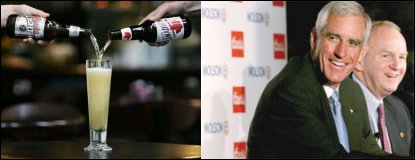
-
Canada's Molson and US-based Coors announced plans for a "merger of equals" of the two family-controlled brewers creating the world's fifth largest beermaker by volume.
The deal "will create a new company with the operating scale and balance sheet strength to take a leading role in the consolidating global brewing industry," the companies said in a joint statement.
With combined beer production of 60 million hectoliters (51 million US barrels), the company to be named Molson Coors Brewing Company will be the world's fifth largest brewing company by volume, the statement said.
"This transaction allows us to create a stronger company in a consolidating global industry while preserving Molson's rich heritage as North America's oldest beer company and Canada's leading brewer," said Eric Molson, chairman of the Canadian firm.
What's the upside for shareholders? None really, since they're already effectively a combined entity with two joint ventures, one in Canada and one in the U.S.; however, long-term value could be created if the potential combination of Coors and Molson attracts a larger suitor, like Heineken or SABMiller, since as the number five global brewer the company would derive most of its earnings from businesses with a number two market position.
- Arik
July 23, 2004
Merck and Schering-Plough: FDA Approves Vytorin as Potential Cholesterol Blockbuster

Merck and Schering-Plough enjoyed a big win to celebrate over the weekend, as Vytorin won FDA approval to take on AstraZeneca’s Crestor, Pfizer’s Lipitor and a host of other statins, as they combine Merck’s Zocor, with a non-statin treatment in Schering-Plough’s Zetia.
-
Vytorin combines Zetia, a cholesterol-lowering agent developed at Schering-Plough, with Zocor, the $5 billion cholesterol-lowering medicine marketed by Merck. By itself, Zetia is far less powerful than the cholesterol-lowering medicines known as statins, such as Zocor, Lipitor and Pravachol. But it works differently, and when Zocor and Zetia are used together, they lower bad cholesterol better than any treatment currently on the market.
The U.S. Food and Drug Administration has a deadline of July 24--Saturday for its decision. Analysts expect a decision either today or Monday. In the last quarter, Zetia generated more revenue than Crestor, a new statin sold by AstraZeneca.
"By combining them at a single tablet and offering them at a single price, you obviously create a benefit to the patient," says Richard Milani, head of cardiology at the Ochsner Clinic in New Orleans. The new pill will be cheaper--both because it will cost less than buying Zocor and Zetia separately and because patients will have only a single co-payment for the pill.
Pricing is expected to emerge as a major issue for Vytorin. It must be priced competitively with Lipitor, which has half the cholesterol market and brings in $10 billion annually for drug giant Pfizer. It may, however, be priced more than Crestor.
Barbara Ryan, an analyst at Deutsche Bank, says Vytorin could eventually grab 13% of the cholesterol market, reaching sales of $3.5 billion in 2008. Zetia sales that year will probably be at least $500 million, and the joint venture could contribute $1 billion in profits each to Merck and Schering. That could be a bigger benefit to beaten-down Schering-Plough than to Merck, which will lose patent protection on Zocor in 2006. Ryan rates Schering-Plough a "buy" based on the upside from the drug. Deutsche Bank does investment banking and owns 1% or more of both Merck and Schering-Plough.
Pfizer can be expected to engage in a pitched marketing battle against any competition, perhaps arguing that lowering bad cholesterol with statins has extra, hard-to-measure benefits that doing so with Zetia does not. But the number of people who should be on cholesterol medicines constantly increases. New guidelines may have increased the number of Americans who should receive some kind of therapy to more than 50 million from 36 million. Currently, only about 11 million people do take such drugs. That exploding market can only bode well for Vytorin.
So, with cholesterol seemingly more important than ever, Merck might just have managed to extend the life of its soon-to-expire Zocor in time to blunt the impact of losing a $5 billion drug.
- Arik
July 22, 2004
9/11 Commission (Intelligence) Report: Failure of Imagination or Failure of Incentives?
 The commission's 585-page report indicates much greater failures than imagination in the national intelligence apparatus throughout both the Clinton and Bush presidencies. Slate.com's Fred Kaplan offers up his excellent analysis:
The commission's 585-page report indicates much greater failures than imagination in the national intelligence apparatus throughout both the Clinton and Bush presidencies. Slate.com's Fred Kaplan offers up his excellent analysis:
-
The biggest puzzle about the 9/11 commission's report is why Thomas Kean, the panel's chairman, said at the start of his press conference this morning that the U.S. government's failure to stop the attack on the World Trade Center was, "above all, a failure of imagination."
It was a strange comment because the actual report—a superb, if somewhat dry, piece of work—says nothing of the sort. The failure was not one of imagination but rather of incentives. It turns out that many individuals, panels, and agencies had predicted an attack uncannily similar to what happened on Sept. 11, 2001. The problem was that nobody in a position of power felt compelled to do anything about it.
And, in conclusion:
-
Everything that the panel wants to do has been tried, in one way or another, in the past. The government doesn't change in so dramatic a fashion unless the president pushes hard for the change. New priorities mean nothing unless budgets reflect them. New superagencies mean nothing unless their managers have the power to control the purse strings of their constituent parts. Better intelligence means nothing unless the president wants to hear it—and at least seriously considers acting on it.
Will a Cabinet-level intelligence czar be able to sort out all the trouble getting agencies to cooperate? One thing's for sure, that stands a lot better chance than teaching them to be more imaginative.
- Arik
July 21, 2004
SCO Loses DaimlerChrysler Lawsuit

-
SCO suffered its first major defeat Wednesday in its legal wars against Linux-using companies, when DaimlerChrysler was granted all of the important points in its motion to dismiss SCO's case.
Judge Rae Lee Chabot of Oakland County Circuit Court in Michigan all but dismissed The SCO Group Inc.'s case after a hearing, which, according to at least one eyewitness, took only about 20 minutes.
This latest ruling is likely to discourage SCO from suing other Unix licensees that failed to certify their use of the operating system. The DaimlerChrysler suit addressed different issues than those in lawsuits SCO has filed against IBM, Novell, and Linux customer AutoZone, but the impact on these other cases is still up for grabs. Regardless, there was joy in Linux-land, at least for the moment.
- Arik
July 20, 2004
EU Clears the Way for Merger of Sony Music & Bertelsmann
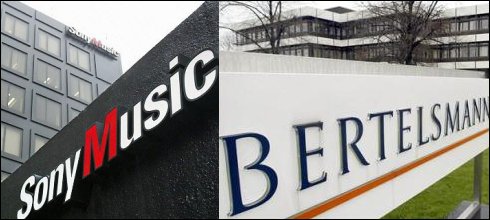
-
European Commission regulators have cleared a merger between the music businesses of Japanese electronics group Sony and German media company Bertelsmann.
EU regulators opened an inquiry into the deal between Sony's music arm and Bertelsmann's music business BMG in February on concerns that a combined group would dominate the market.
If the merger goes ahead, the market will be carved up between four instead of five majors: Vivendi's Universal, the newly-created SonyBMG, Warner and EMI. Together they would share around 80 percent of European recorded music sales.
The European and US competition authorities have run parallel investigations into the merger, which will create the world's largest music company by market share according to 2003 figures.
The merger will bring together Sony stars such as Barbara Streisand and Beyonce and BMG stars, including Elvis Presley and Christina Aguilera.
The Japanese and German parent groups argue that their businesses need to join forces to tackle the crisis in the global music industry faced with both pirate CDs and an explosion of illegal music downloading.
At least Sony got its new music service and MP3 player to market a few weeks ago, or its biggest competitor would be the iPod/iTunes platform. Wait a second... it already is!
- Arik
 "Competitive Intelligence applies the principles of competition and lessons of intelligence to the need for enterprise awareness and predictability of market risk and opportunity. CI has the power to transform an enterprise from also-ran into real winners with agility enough to create and maintain sustainable competitive advantage."
"Competitive Intelligence applies the principles of competition and lessons of intelligence to the need for enterprise awareness and predictability of market risk and opportunity. CI has the power to transform an enterprise from also-ran into real winners with agility enough to create and maintain sustainable competitive advantage."
